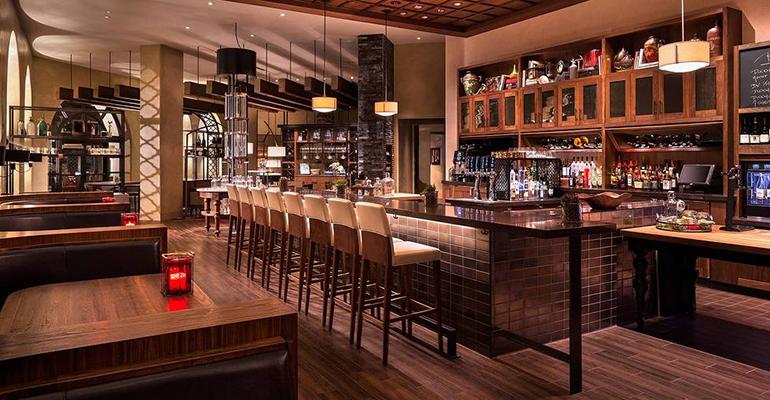Labor in the foodservice industry has always been a challenge. COVID made it a full-blown crisis.
But a crisis can be handled.
For executives in the lodging foodservice space, getting a firm grip on finding and retaining quality employees means confronting the challenge on several fronts — from salary, scheduling, training and opportunities for advancement, to upping benefits, perks and, increasingly, catering to workers’ evolving lifestyle needs and expectations.
Operators are looking at all available means to offset labor demands while providing top-flight service. This includes simple operational shifts like emphasizing menu items that can be easily executed with reduced staff yet still drive both margin and guest satisfaction.
Lou Trope, vice president of food and beverage, mountain division at Vail Resorts in Englewood, Colo., advised operators to work with partners and suppliers to find products that arrive in advanced forms of processing to reduce labor hours. In the front of the house, operations should embrace technologies that empower guests, such as app-based ordering and automated beer dispensing.
Here are some other strategies that lodging foodservice executives are using to successfully solve the labor problem:
Third parties: Partnering with a third-party restaurant or local food truck brand to handle food and beverage is an alternative, since they often bring their own labor to the equation.
“This can not only relieve some stress on needed staffing,” Trope pointed out, “but is also seen as a benefit/new experience for the guest, as well as support for the local community.”
Tom Kelley, president of AccessPoint Group, a consulting firm in Fort Lauderdale, Fla., also feels it makes sense to partner with a third-party restaurant or food truck.
“It is already happening on a large scale with central kitchens or ghost kitchens,” he said. There does, however, need to be a good degree of concentration for the host kitchen facility to get the food quickly to neighboring hotel rooms.
Marriott is outsourcing banquet business to local or regional outside caterers, and the restaurant business to outside restaurant groups.
Foster Frable Jr., president of Clevenger Frable LaVallee in White Plains, N.Y., pointed to the flagship Marriott Marquis in Manhattan, which has brought in New York restaurateur Danny Meyer’s Union Square Hospitality Group and its Union Square Events division, respectively, to run both the restaurant and bar and banquet operations.
“It is my understanding that if this is successful, they will continue to roll this out into other properties,” Frable said.
Training: Operators that cross-trained their people prior to the pandemic are faring better with returning team members.
Larger operators can provide in-house training and offer an excellent future to people from any educational background, explained Christian Kolb, the principle of Artichoc, a consulting firm in Bad Vilbel, Germany.
“Well-trained employees can be deployed worldwide. The young generation is no longer about working unconditionally, but rather about creativity, personal responsibility, development, breaking out of the normal cooking, etc.,” Kolb said. “This will be a theme for bonding in the workplace in the future.”
Benefits: Larger hotel and hospitality companies usually offer better benefits packages, noted Kelley. “Some, like Las Vegas Sands, for example, paid employees all during the pandemic, showing great concern for their team members.” Individual operations had a tougher time, with many running on week-to-week cash flows and unable to retain staff.
Opportunity: Crafting a more diverse work environment with multiple opportunities can help retain employees. Some brands do this very well, Trope noted, allowing staff members to work in multiple departments to gain broader experience and beef up their schedules.
Perks: With the labor market as tight and competitive as it is, hotels are offering perks to food-and-beverage staffers and new hires. These can include room discounts, which Trope said “will always be attractive. The key now is to go beyond. Connections with philanthropic environmental or social awareness programs can transcend basic benefits and give people a reason to be part of an organization that better aligns with their values.”
Lifestyle: Arguably the most important factor of all is sociological in nature. Kolb made the case that more needs to be done to meet employees’ evolving lifestyle needs.
“For most people, it's no longer just about money and social benefits. They are also concerned about family formation and a life after their daily work,” Kolb said.
Rudy Miick, the founder of The Miick Companies LLC in Boulder, Colo., said, “The smart operators are sharing a bigger picture of being in an amazing industry, perhaps all the more at a special time of ‘coming back.
“The smart ones are not posting ads, they are telling brand stories about impacting people’s lives on a daily basis in the hospitality and foodservice industry; all the more in the literal world of hotel/motel experience,” Miick added.





